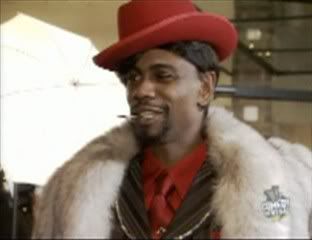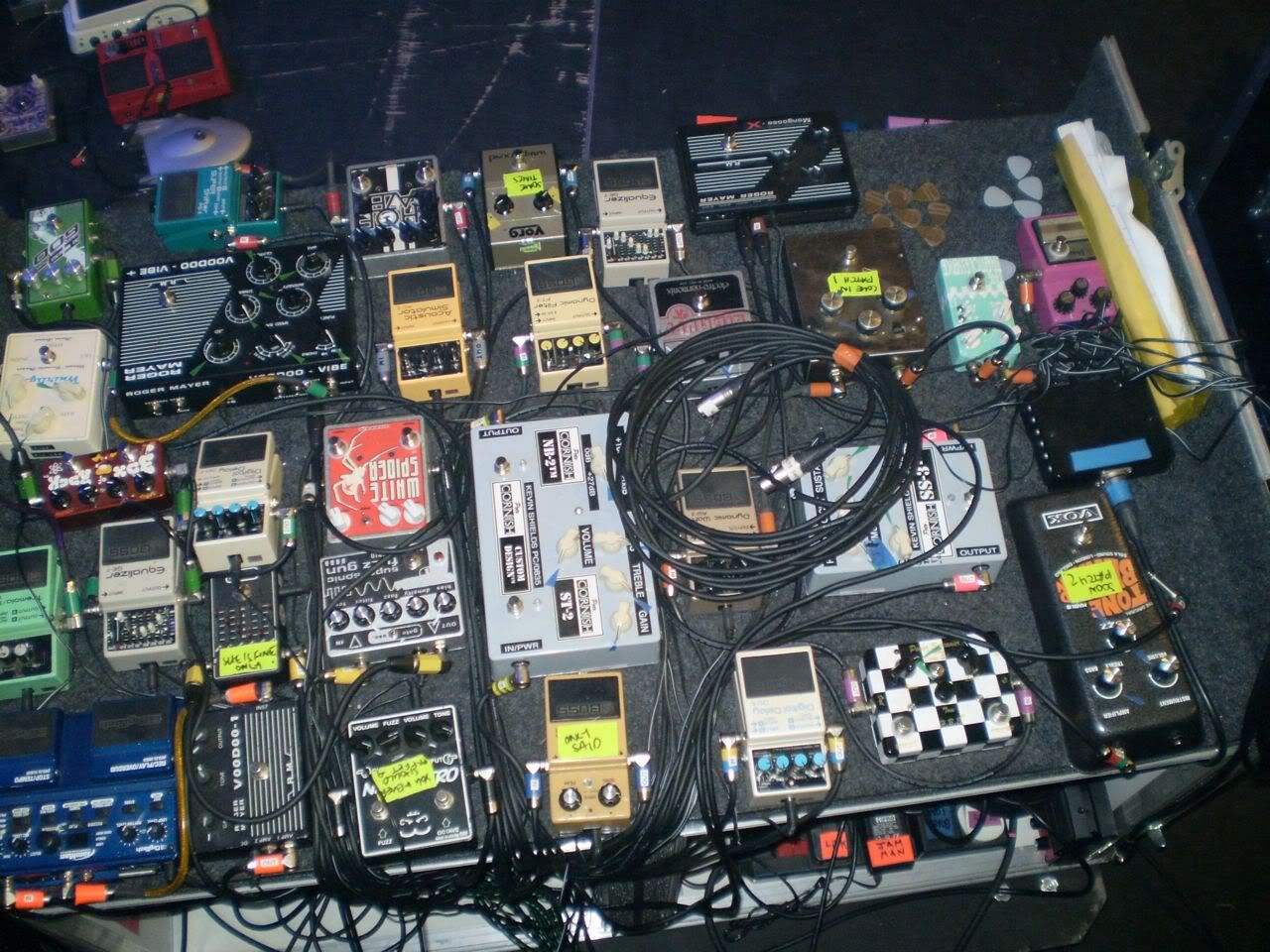(I was about to post this two weeks ago when my internet connection went dead, hence the handful of borderline-obsolete references & links.)While explaining to a friend some of the
ridiculous online arguments I get dragged into (okay, often by myself), I remarked that for people speciously concerned with the future, the opposition spends a hell of a lot of time talking only of the past. Now, my friend doesn't waste his time reading
overlong & defamatory pseudo-psychoanalytical tracts that basically amount to grandiloquent iterations of "Y'all just
hatin'!" But he knew what I was talking about.

"I read these news articles," he said, "about some recently-unearthed ancient Abyssinian wooden tablet that had been written upon in wax. Obviously, the wax has long since disintegrated, but they can use computers and subcutaneous radar to reconstruct it, or whatever, and this will reveal some fantastic ancient truth... Now, perhaps I'm living too firmly in the present, but
who cares? In a real and immediate sense, insofar as dealing with the situation we're in right now, who fucking cares?"
Putting a finer point on it, we were wondering exactly what good will be served by the posthumously-conceived cultural theory
book about Michael Jackson (that I maintain is
as macabre and exploitive as anything
Jermaine or
Joe is peddling). Is this really needed? Will it actually offer any fresh insights, intimations, angles, or gags that were somehow
missed in the past 25 years of MJ's increasingly ulcerated ubiquity? Even if it
does flint a new spark, how does that help us?
America's cutting-edge crackpots are
putting on their brownshirts, people are
losing their jobs
all over the damn place, Taiwan was
almost washed onto the seabed, Iran's
still all kinds of fucked up, and not even
Bill Ward & Tony Iommi can keep it together for
old times' sake. The fuck do I care about Michael Jackson as reified symbol of Reaganite predatory accumulation?
But oh me, oh my - I've just disqualified myself from the conversation, at least according to Mark "K-Punk" Fisher's
rules of (dis)engagement. I've exhibited "the dull malice of snatching people's toys away from them," perhaps even "a poisonous envy of others who are possessed by this kind of depersonalising passion." Maybe I'm what Mark calls a "grey vampire" ("Like moths... drawn by the light of energetic commitment, but unable to themselves commit"), though I'm more probably a "troll". As some gonzoid shit-talker outside the south English inner sanctum of
serious cultural theory, surely I "think that is a
duty to deflate enthusiasm and puncture projects", what with my incessant entreaties for "more bitterness, less enthusiasm" from behind my "devil's advocate" parapet. Yet fear not, for Mark has a foolproof prescription to counteract my rhetorical toxicity:
Once you've established they are a troll, sever all contact with them and - this is imperative - don't read anything they write... The final victory over them is achieved by simply persisting in the pursuit of a project, refusing to allow yourself to be ensnared in the self-doubts and impotent autocritique... Occasionally GVs can be caught out. Beneath the moth-grey sadness of the GVs, there is always a raging red core of useless anger and resentment - the worst kind of anger and resentment, because it is directed against those who have projects.
To prune this academic survival guide to its essence: ignore anyone who is less than sycophantically supportive, because they're just jealous loafers whose accomplishments are nil. Gosh, I
know there's a conventional nickname for this energy-sapping backseat driver that Mark's daintily avoided employing... what is it, what is it, what is it?
Oh yeah,
that's right -
Haters!

A short while ago, Ads Without Products noted that "grey vampires" and Mark's taxonomic retailoring of "troll" seem to be code for
"those who disagree with Mark":
The fact of the matter is that there are no conversational slots to fit into other than fawning agreement apparently. Respectful criticism is in fact disrespectful passive-aggressiveness, but disrespectful criticism won’t even be countenanced... The analysis of social structures and their deformative effect upon discourse isn’t meant to be employed as a sort of defensive wall, an affirmative action programme for the bad ideas of the (self-positioned) abject. Anyone who disagrees with Mark disagrees because they are the over-confident agents of power and class. Sorry, though. Whatever the social dynamics at play, it could be that your ideas are simply wrong.
...doesn’t this seem like the sort of thing you would say when you’re not so much resolute in your ideas, single-mindedly committed to your project, but rather scared shitless that someone’s found a hole or holes, someone is asking questions that you simply don’t have the guts or brains or honesty to answer?
Two months later, Mark still refuses to respond directly to any of AWP's criticisms - which at least demonstrates a practical harmony among Mark's ideas & actions. Unfortunately, limiting discussion of the academic
bestiary to what amounts to a monologue doesn't bolster Mark's own hypothesis. Bloody-minded fealty to an idea that someone else has discredited isn't gambling to "uncover new worlds", it's just ol'-fashioned idiocy. This puerile plugging of ears reminds of one of my favourite
Space Ghost quotes, as he calmly describes to Bob Costas the sensation of having his skull heated to "a scorching 450 degrees":
You see, my brain's sending a message to my arms right now to put my head out. But I'm choosing to ignore that.
To be sure, this speculatively-inflated vilifcation of phantom Haters is one of
the dumbest memes to have gathered steam around certain blogipelagos - and not just because it's the dialectic equivalent of
going foetal. If Mark wasn't Quixotically trying to reappropriate the term "troll", then he appears to have radically misunderstood the word. First, he fails to distinguish between just
some prick talkin' shit on a bulletin board, and a
troll. Real trolls, trolls-by-vocation, capital-T troublemakers who can crack into
Kevin Mitnick's iPhone - like those profiled in the NYT
"Malwebolence" article from last August - are the frontiersmen stationed at the ever-expanding outermost fringes of the internet. They are the self-styled outlaws of an online Wild West of which most of us genteel folk are scarcely aware. Contrary to Mark's understanding, trolls neither "[spend] a great deal of time on the web saying how debased, how unsophisticated, the web is," nor do they "lose all their power once you cease to pay them attention." Trolls are the very engine of internet innovation, thanks to their fluid approaches to morality & identity, their circumvention of authority, and
yes their ability to expand online hostilities into the physical realm. (For a detailed illustration of how trolls can bring the intermedial ruckus,
google Adam L. Goldstein.) Trolls' ability to infiltrate & incinerate an online environment is the very kind of revolutionary, scorched-earth, "Year Zero" program of which Mark is (or until
very recently was) very fond.

Orotund excuses for ignoring any & all criticism are very seductive, and so aboard the bandwagon an embarrassing number of people jumped, often making their own additions to the menagerie of academic boogeymen.
Larval Subjects proposed a defensive counterpart to the grey vampire's passive-aggressive parasitism: the Minotaur.
For the Minotaur it is never possible for there to be a genuine philosophical difference or a genuine difference in positions among philosophers. Rather, the Minotaur converts every philosophical opposition into a misinterpretation. The text(s) guarded by the Minotaur thus become a Labyrinth from which there is no escape.
Of course, when
Mikhail Emelianov pointed out that the Minotaur was a
prisoner, not a guardian, of the Labyrinthe, he was immediately accused of being... a troll. How quickly
that conversation cocooned itself.
This mythological mix-up, along with Mark K-Punk's erroneous understanding of what monsters actually inhabit the internet, is symptomatic of the pandemic problem with online punditry: far too often, people just don't know what the fuck they're talking about.
Seems quite obvious, I know. But I'm not even talking about the scatological free-for-alls of, say,
YouTube comment threads; I'm speaking strictly of widely-read, respected writers with obvious enthusiasm for their subjects and a large font of knowledge & experience from which to draw. Even
they seem to suffer from twin inabilities to admit (1) there's knowledge beyond their specific proficiency, and (2) that sometimes,
sometimes, they're wrong. I've made each of these missteps, mostly the former, though I try to outline the gaps in my expertise up front. I know next to nothing about the broader sweep of popular electronic music; in such a discussion, I'd have to defer to
Simon Reynolds,
Zone Styx, et al. Similarly, I'm largely ignorant about architecture (beyond the perfunctory opinion that brutalism is butt-ugly) and so submit to the superior acquaintance of
E&V's Murphey or
Owen Hatherley.
However, when Hatherley starts
waxing forlorn about the Wu-Tang Clan, my bullshit detector registers in the red. That Hatherley "decided to investigate what the GZA is up to now" - as opposed to having given
Pro Tools several spins when it dropped - betrays what's little more than a touristic interest in hip-hop. The anonymous plaintiff who asks "where's [Wu-Tang's] grit, the murk?" has clearly missed the first ten years of Cage's career, Ghostface's fantastic
Fishscale, the
widely-hailed Madvillain, Madlib's grubby production on Mos Def's
The Ecstatic, and damn near the whole Def Jux catalogue. More disturbingly, the litany of references to
The Wire and preoccupation with
"unglamorous, non-gangsta poverty" seem to insist that potent hip-hop (and perhaps African-American culture in general) is born only of dire, undesirable circumstances. At its most benign, this is the juvenile drama-club/Hot Topic contention that suffering is essential to art; at worst, it's a patronizing claim that authenticity within hip-hop can only be earned by dodging bullets at
Cabrini Green. Evidently, middle-class black musicians such as Erykah Badu, Outkast, and the Roots need not apply.

Aside from literally ghettoizing an art form that is meant to be emancipatory, this condescension demands that hip-hop remain immature. It demands that Jay-Z, rather than celebrating his ascension from the Marcy Projects to
the Forbes Top 20, continue slinging rhymes about "bare cupboards, late cheques, unemployment." It demands that Ghostface, age 39, remain the raging 23-year-old he was on
Enter the 36 Chambers. Dennis Coles himself, however,
refuses to deny the passage of time and its effect of both himself and his art:
There aren’t enough men in the world. You got all these cats running around, trying to be little 19-year-old niggas and shit. But you’s a man, B. It’s time to grow up.
But this isn't a pissing contest about who has a more genuine affection for hip-hop. This is about the manner in which "cultural theorists" (at least those who deserve the scare quotes) construct and support their arguments. Most arrive at the table with a well-manicured set of aesthetics and/or a predetermined cultural hypothesis and cherry-pick music, film, etc. that supports the conclusion to which they've
already come. They do this by focusing on relics, ephemera that has already settled into a well-worn niche in the cultural canon - precisely why an old co-worker of mine lambasted hip-hop "fans" who only listened to hip-hop that was at least already
a decade old. There's not much bravery in basing a theory entirely on hindsight, nor is
parading the urn of a long-interred artistic phenomenon, a.k.a. hauntology, anything other than another form of necrophilic post-modernism. So until someone produces an essay on how, for example, Lil Jon or the Three Six Mafia are demonstrative of the post-millenial rapacity of George W. Bush's America, I won't believe that they approach their analysis in any other way.

Not to mention - I defy anyone to come up with a succinct-yet-sweeping diagnosis of Michael Jackson's terminal simulacrum in America's memory to top
Katt Williams'.











































